Character and Citizenship Education
Character and Citizenship Education
CHIJ OLQP anchors itself on Character Education as a foundation for student learning and success. This is in line with the mission of our school’s founder, Blessed Nicolas Barre, and the Infant Jesus (IJ) sisters who came to Singapore in 1854 to provide education to girls who were disadvantaged.
Character and Citizenship Education (CCE) in CHIJ OLQP aims to inculcate values, a strong community spirit and a sense of national identity among the students. The CCE 2021 Curriculum Frame underpins a holistic education to enable the school to better prepare our students to thrive in a fast-changing and highly-connected world. It emphasises the interconnectedness of core values, social and emotional competencies, and civic literacy, global awareness and cross-cultural skills that are critical for our students’ character and citizenship development.

Being a Catholic school, our approach is aligned to the School Mission, Values and Motto. They provide the guiding principles for our school as we develop a well-balanced curriculum incorporating the following:
-
CCE Programme
-
Student Leadership
-
Student Management
CCE Programme
The school adopts the Virtues Project as a CCE teaching and learning tool. It focuses on 52 virtues that are aligned to promote the school’s values of Truth, Justice, Freedom and Love. It plays a significant role in shaping the character of the students and provides empowering strategies that inspire the practice of virtues among the staff, students and parents. In line with the Virtues Project, staff, students and parents observe the following:
-
Speak the language of virtues;
-
Live the virtues; and
-
Use the virtues in everyday life.
The virtues are taught explicitly and imparted through various platforms to promote and deliver quality learning experiences for the development of social-emotional competencies and citizenship dispositions in our students.
Pre-Assembly and Assembly Programme
The morning pre-assembly and assembly programmes are platforms to reinforce in students the virtues and expectations as a school. As a Catholic school, we also come together in prayer and worship in the morning to start each day.
CCE Lessons
CCE Lessons are taught through CCE Form Teacher Guidance Period (FTGP) and CCE Mother Tongue Language (MTL). At Lower Primary, CCE Lessons also include the Programme for Active Learning (PAL). Lessons in CCE (FTGP) and CCE (MTL) use stories, scenarios, songs and games, while PAL creates opportunities for students to apply their learning through the domains of Sports & Games, Outdoor Education, Visual Arts, and Performing Arts. Intentional effort has been made to cover different contexts in order to provide distinctive learning experiences across CCE (FTGP) and CCE (MTL) lessons. The different approaches in the lessons are designed to reinforce teaching and learning of values, develop social-emotional competencies and nurture citizenship dispositions. These lessons are carried out with fidelity to ensure that all the planned Learning Outcomes for CCE are delivered, and our students have a strong foundation to build character, develop social-emotional competencies and citizenship dispositions.
Sexuality Education (SEd) lessons are taught as part of CCE (FTGP) at Primary 5 and 6. In SEd, our students learn to understand the physiological, social and emotional changes they experience as they mature.
Lifeskills and Religious Education Lessons
Weekly Lifeskills and Religious Education lessons are designed to build our students’ virtues, social-emotional competencies and citizenship dispositions. During these lessons, students go through activities such as role play, group discussions, sharing and reflections to learn about the virtues and gospel values in various contexts, stories or real-life situations. Non-Catholic students attend Lifeskills lessons while Catholic students attend Catechism lessons. Non-Catholic students who wish to attend Religious Education lessons are welcome to opt in and join their Catholic friends.
Social Studies
Social Studies seeks to inculcate in our students a deeper understanding of the values that define the Singapore history and culture, nurture dispositions that will inspire them to show concern for society and the world in which they live, and demonstrate empathy in their relationships with others.
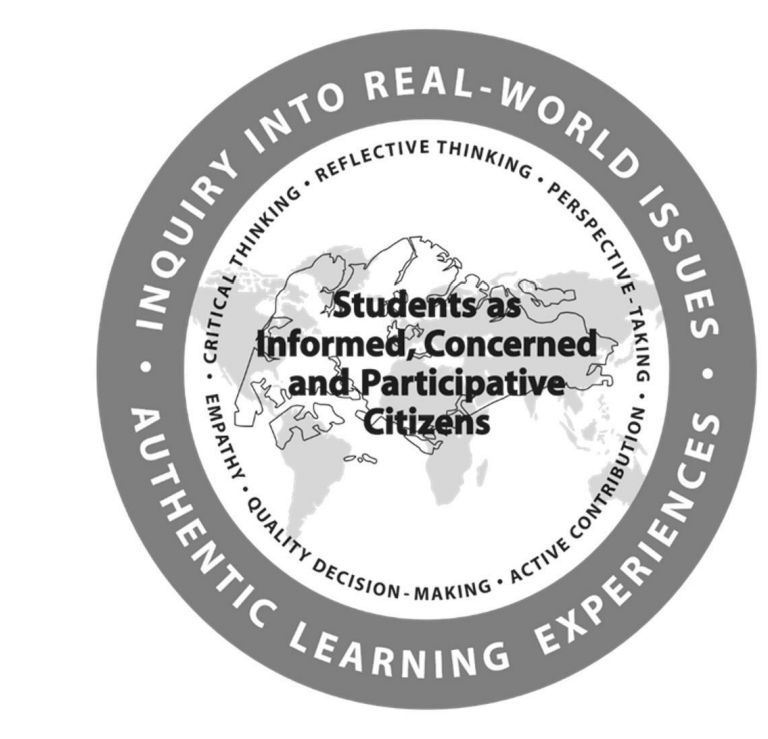
In CHIJ OLQP, the Social Studies team looks into providing authentic learning experiences which form part of the teaching and learning of Social Studies. Students participate in field-based learning through learning journeys that take them to places such as museums and heritage trails. These experiences strengthen students’ understanding and appreciation of Singapore and enable them to make connections between knowledge learnt with real, authentic experiences.
National Education Commemorative Events
Besides the weekly CCE lessons, the four National Education (NE) Commemorative Days (Total Defence Day (TDD), International Friendship Day (IFD), Racial Harmony Day (RHD) and National Day (ND)) are an important part of our students' learning experiences in school. These events aim to provide our students with the knowledge, skills and values to understand and appreciate Singapore’s history, realities and challenges and guide them into developing a national identity. It also seeks to foster inter-ethnic understanding and appreciation for one another’s culture in a multicultural classroom setting.

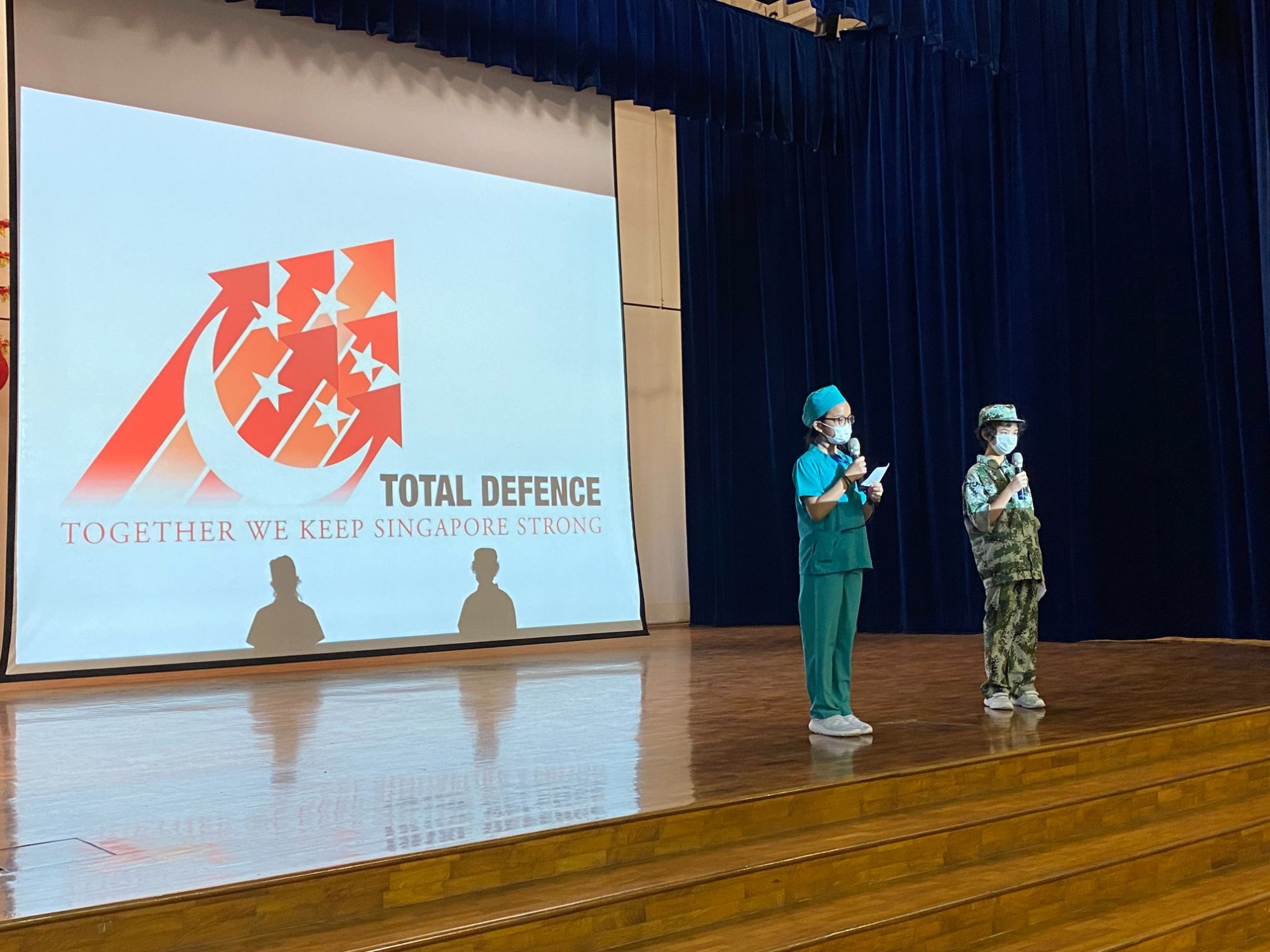
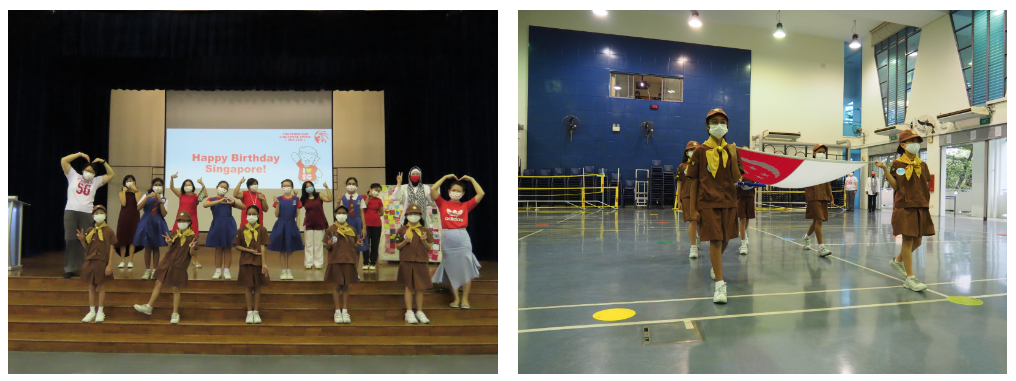
Values-In-Action
The school adopts a 2-tier approach, with three levels in the delivery of our Values-in-Action (VIA) programme. The 2 tiers serve to provide diverse experiences to different groups of students.
Tier 1
All students will demonstrate the values learnt using various platforms. Besides encouraging students to put into practice the virtues in their everyday lives, the school provides extended learning opportunities for students to put values into action through the Student Development Experiences (SDE) programmes, such as CCA and VIA activities.
Level 1 (Class Experiences): Students demonstrate community spirit and graciousness through regular individual and class activities.
Tier 2
Activities are planned for selected groups of students to enable them to contribute at a broader and deeper level, and for student leaders to extend and stretch their potential. This helps them experience the gift of service beyond the school.
Level 2 (Beyond Class Experiences): Students put their virtues into action through a thematic approach. The focus is structured around the following themes: Primary 1 and 2 (Self and Family), Primary 3 and 4 (School and Community), Primary 5 and 6 (Nation and World).
Level 3 (Leadership Experiences): Student leaders are given the opportunity to champion a cause, lead and plan for community service projects, and volunteer in student-led activities.
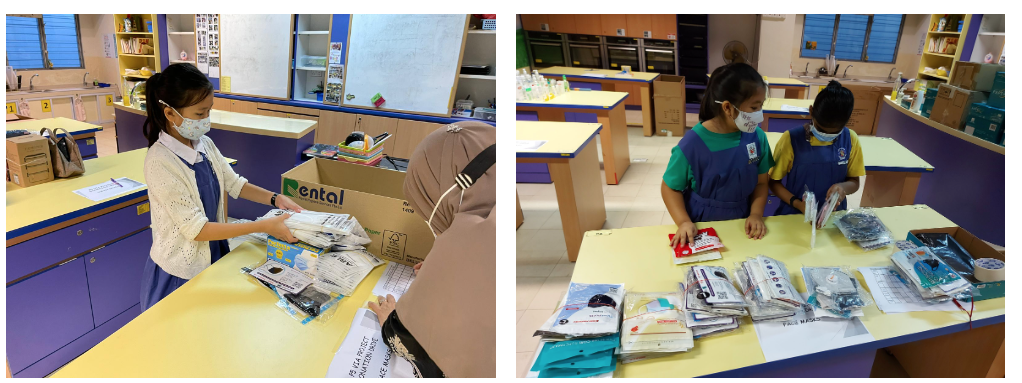
Inter-disciplinary Project Work
Inter-disciplinary Project Work in CHIJ OLQP aims to equip our students with the skills to think creatively and provide them opportunities to work with their peers and innovate. It also serves as a platform to expose our students to experiential learning. Our students will be able to synthesise knowledge from various areas of learning and inventively apply it to real life situations. Through the process, our students develop and acquire 21st century competencies which prepare them for lifelong learning and future challenges.
Education and Career Guidance (ECG)
Education and Career Guidance (ECG) is developmental in nature and seeks to meet the needs of our students at every stage of their education. Through ECG lessons and activities, our students will be equipped with the necessary knowledge, skills and values to make informed education and career decisions that will help them to contribute to Singapore’s future.
Cyber Wellness Education
At CHIJ OLQP, we adopt MOE’s Cyber Wellness framework, which is to develop our students’ instinct to protect and empower themselves to take responsibility for their own well-being in cyberspace.
The three principles, ‘Respect for Self and Others’, ‘Safe and Responsible Use’ and ‘Positive Peer Influence’ when adhered to, will anchor our students’ well-being in cyberspace as they will then be able to make careful and well-considered decisions. The virtues of discipline, responsibility and respect are reinforced through our Cyber Wellness programme.
MOE Cyber Wellness Framework

In line with MOE’s curriculum, we aim to equip our students with the knowledge and skills to help them to become responsible digital learners. When navigating cyberspace, students should demonstrate respect for self and others and practise safe and responsible use. Students of CHIJ OLQP should also be a positive peer influence by harnessing technology for collaboration, learning and productivity, as well as advocating positive use of technology for the good of the community.
Student Leadership
Student Leadership development at CHIJ OLQP seeks to develop leaders who:
-
act with compassion;
-
have moral courage; and
-
lead and serve with humility.
The school has a 2-tier leadership development programme. It is designed to provide baseline leadership skills acquisition for all students, and extend opportunities for students with aptitude and potential, to lead and serve the school and the community through various student groups.
At the school level, “I Can Serve”, aims to extends the area of focus to ‘Create a Leadership Culture: Shared Leadership’. At this level, opportunities are provided for potential student leaders to serve in school-level leadership roles, e.g. prefects, CCA leaders and IJ Ambassadors.
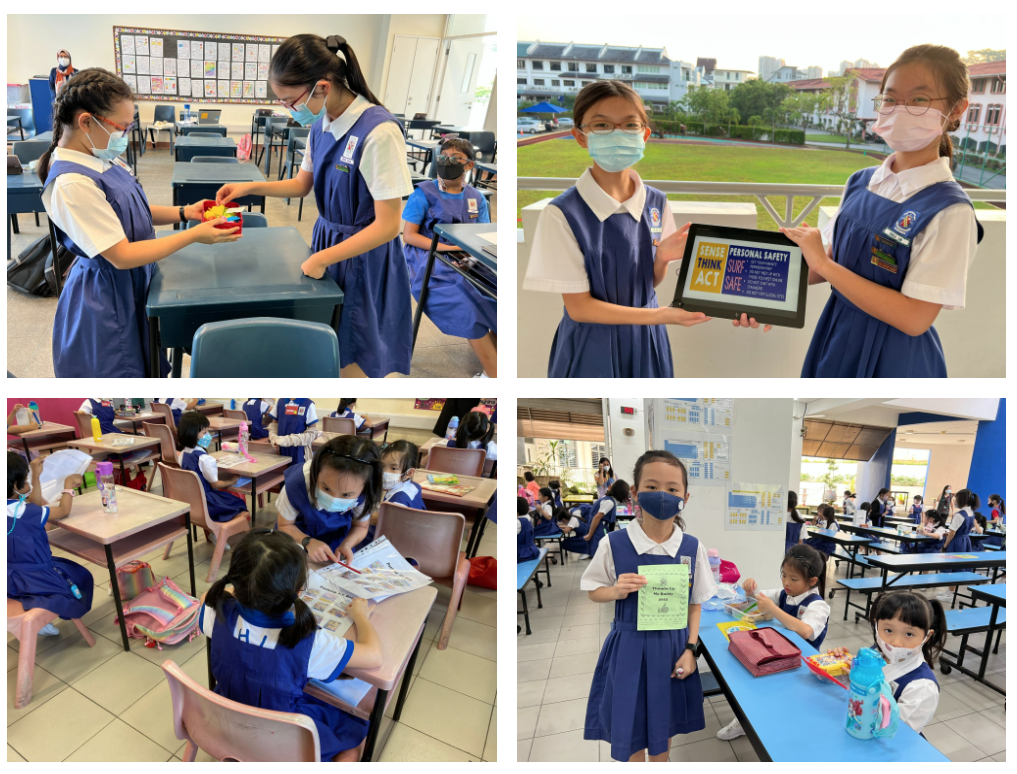
Student Management
The Student Management team aims to support our students' social and emotional well-being through the following areas,
-
Positive Discipline; and
-
Case Management
Positive Discipline
At CHIJ OLQP, we seek to inculcate in students a sense of self-discipline and provide a safe and positive learning environment for our teachers and students. We encourage students to respect the rights and feelings of others, taking responsibility and accepting the consequences for their own actions.
The school’s disciplinary measures enable our students to learn and understand the consequences of their actions and choices, and take responsibility so as to make the right choices in future.
To sustain positive behaviour in school and at home, close cooperation between the school and home is essential for the maintenance of good discipline. This partnership will ensure a pleasant and safe school environment where children can learn and grow to be responsible individuals.
In order to support all students, staff and parents, we have put discipline structures in place to provide explicit parameters of acceptable behaviour. School Rules and Consequences are reflected in the Student Handbook and these are communicated to all students at the beginning of the year and reinforced at various platforms.
Supporting Students with Special Educational Needs
Our Case Management Team (CMT) anchors itself on a culture of care by enhancing teacher-student relationship and providing support for students with special educational needs. They play a vital role in ensuring that our students with special educational needs are supported through the various intervention strategies available.
There is a team of trained officers who dedicate their time to monitor the social-emotional, behavioural and learning needs of our students closely. The Special Educational Needs Officers (SEN Officer), School Counsellor, Teacher Trained in Special Needs (TSN) and Teacher Counsellors (TC) work collaboratively with the school’s Case Management Team to understand the various special needs of our students and work in partnership with parents, MOE specialists and psychologists to help our students.

